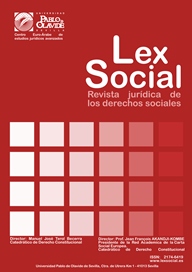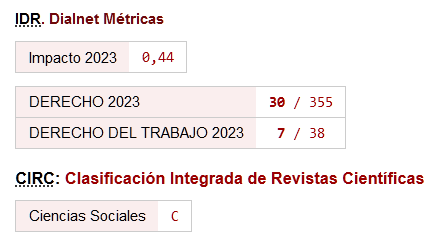From the (macro) social rights of conflict to the (micro) social rights of resilience in the constitutional paradigm of the global market order: new forms of exploitation through material devaluation of labour
DOI:
https://doi.org/10.46661/lexsocial.7976Keywords:
social constitutionalism, legal market order, class liquefaction, wage devaluation, digitalisationAbstract
The aim of this paper is to reflect on the causes of the end of wage Labour as a political subject, or, in other words, on the perennial process of the irrevocability of materially devalued wage labour initiated in the 1980s. To this target, the analysis is situated within the framework of the Critical Theory of the Constitutional Law of Conflict. This implies redirecting the approach to State-Law-Constitution relations. Specifically, if the constitutionalisation of Labour represented the juridification by the fundamental text of the redistributive conflict determining the new functions assumed by the form of social State and its Constitution, the new constitutional paradigm of the legal order of the market is materialised around the unconditional centrality of the economic link of the market, which has in the Law of the Union its most complete legal form. The main function of the new constitutional order is to undo the conflict by placing the strategy of accumulation for accumulation's sake as the only link of legitimacy of the constitutional paradigm of the market. The confrontation between constitutional paradigms is particularly visible at times of systemic crisis and the new phases of global capital. The denaturalisation of labour as a mere functional factor in the interests of global capital, together with the reproduction of new forms of free labour under the digitalisation phase of capital, has given rise to proposals (such as, the Universal Basic Income) that have in common the reversal of the ever-widening spaces of new forms of exploitation, by devalorisation, of labour. However, the majority of these approaches go further in denaturalising the subjectivisation of conflict, of class struggles, when the current phase of the constitutional paradigm of the market has not precisely brought about the end of wage labour. On the contrary, its validity has been accentuated, generating as a central question how to recover the unity of Labour as a political subject and, therefore, the structural role of the working classes in the processes of reproduction of global capital.
Downloads
References
ACCORNERO, A. (2001): «Dal fordismo al post-fordismo: il lavoro e i lavori», Quaderni di Rassegna Sindacale, nº 1, págs. 7-25.
ARRUZZA, C. Y CIRILLO, L. (2018): Dos siglos de feminismos. Los ejemplos más significativos, los problemas más actuales, Barcelona, Sylone.
ASTOLA MADARIAGA, J. (2017): «Los pactos constituyentes contra natura o la subordinación sistémica de las mujeres», Revista "Cuadernos Manuel Giménez Abad", nº Extra 5, págs. 43-57.
BARCELLONA, P. (1995): «Crisi dello Stato Sociale e strategia dei diritti: un'ipotesi critica», en: AA.VV., Le regioni del diritto. Scritti in onore di Lugi Mengoni, Tomo III, Milano, Giuffré, págs. 1697-1722.
BARRERE UNZUETA, M.A. (2018): «Filosofías del Derecho antidiscriminatorio: ¿qué Derecho y qué discriminación?: una visión contra-hegemónica del Derecho antidiscriminatorio», Anuario de Filosofía del Derecho, nº 34, págs. 11-42. https://doi.org/10.53054/afd.vi34.2326
BAUMAN, Z. (2022): Tiempos líquidos. Vivir en época de incertidumbre, Barcelona, Tusquets.
BECK, U. (1986): La sociedad del riesgo. Hacia una nueva modernidad, Barcelona, Paidós.
BREDGAARD, TH., LARSEN, F. Y MADSEN, P. K. (2008): «Flexicurity: In Pursuit of a Moving Target», European Journal of Social Security, 10(4), págs. 305-323. https://doi.org/10.1177/138826270801000401
CASSASAS, D. (2018): Libertad incondicional. La renta básica en la revolución democrática, Barcelona, Paidós.
CHUNG, H. (2022): The flexibility paradox: Why flexible working leads to (self-) exploitation, Bristol University Press, Policy Press. https://doi.org/10.1332/policypress/9781447354772.001.0001
CHRISTODOULIDIS, E. (2021): The Deep Commodification of Labour. In the redress of Law: Globalisation, Constitutionalism and Market Capture (Global Law Series), Cambridge, Cambridge University Press, págs. 395-430. https://doi.org/10.1017/9781108765329.016
https://doi.org/10.1017/9781108765329.016
DELFANTI, A. (2021): The Warehouse. Workers and Robots at Amazon, London, Pluto Press. https://doi.org/10.2307/j.ctv2114fnm
DE STEFANO, V. (2016): «The rise of the «just-in-time workforce»: on-demand work, crowdwork and labour protection in the «gig-economy», Conditions of Work and Employment Series, nº 71, International Labour Office, págs. 1-43. https://doi.org/10.2139/ssrn.2682602
DURAND, C. (2021): Tecnofeudalismo, crítica de la economía digital, Donostia, Kaxilda.
ESQUEMBRE CERDÁ, M.M. (2006): «Género y ciudadanía, mujeres y Constitución, Feminismos», nº 8, págs. 35-52. https://doi.org/10.14198/fem.2006.8.03 https://doi.org/10.14198/fem.2006.8.03
FRIEDMAN, M. (2012): Capitalismo y libertad, Madrid, Síntesis.
FUCHS, M. (2006): «La reforma del mercado del trabajo en Alemania», Revista de Derecho Social, nº 36, págs. 235-250.
GARCÍA HERRA, M.A. (2022): «Estado y soberanía en la nueva fase de acumulación: entre crisis de la integración europea y la reconstrucción del espacio global», en: LASA LÓPEZ, A., GARCÍA HERRERA, M.A. Y MAESTRO BUELGA, G. (coords.): La refundación de la Unión Europea y la nueva centralidad estatal, Valencia, Tirant Lo Blanch, págs. 225-276.
GUAMÁN HERNÁNDEZ, A. Y TRILLO PÁRRAGA, F. (2021): «La transformación del trabajo», en ESTÉVEZ ARAUJO, E. (dirs.): El derecho ya no es lo que era: las transformaciones jurídicas en la globalización neoliberal, Madrid, Trotta, págs. 487-504.
GUAMÁN HERNÁNDEZ, A. Y SÁNCHEZ OCAÑA, J.M. (2017): «Cuarenta años de Constitución del Trabajo: historia de un proceso deconstituyente», Ius fugit: Revista interdisciplinar de estudios histórico-jurídicos, nº 20, págs.183-246.
LOSURDO, D. (2013): La lucha de clases. Una historia política y filosófica, Barcelona, El Viejo Topo.
MARTELLONI, F. Y PASCHIER, T. (2006): «I licenziamenti in Italia e in Francia: la tutela del datore di lavoro», Rivista Giuridica del Lavoro e della Previdenza Sociale, nº 24, págs. 779-818.
MAESTRO BUELGA, G. (2022): «Las precondiciones para la recuperación del espacio constitucional estatal», en: LASA LÓPEZ, A., GARCÍA HERRERA, M.A. Y MAESTRO BUELGA, G. (coords.): La refundación de la Unión Europea y la nueva centralidad estatal, Valencia, Tirant Lo Blanch, págs. 173-203.
MAESTRO BUELGA, G. (2021): «La ruptura neoliberal del Estado social y la crisis del paradigma constitucional», en: MAESTRO BUELGA, G., GARCÍA HERRERA, M.A Y LASA LÓPEZ, A. (dirs.): Crisis de la Constitución. Globalización neoliberal e integración europea, Granada, Comares, págs. 1-38.
MÂRCETA, P. (2021): «Platform capitalism - towards the neo-commodification of labour?», en HAIDAR, J. Y KEUNE, M (eds.): Work and Labour Relations in Global Platform Capitalism, United Kingdom, Edward Elgar Publishing, págs. 69-91. https://doi.org/10.4337/9781802205138.00011
MARRADES PUIG, A.I. (2020). «Diseñando un nuevo modelo económico: propuestas desde el derecho constitucional y la economía feminista sobre el cuidado y la igualdad frente a la crisis COVID-19», IgualdadES, nº 3, págs. 379-402. https://doi.org/10.18042/cepc/IgdES.3.04
MILHAUT, C. J. Y PISTOR, K. (2010): Law&Capitalism. What corporate crises reveal about legal systems and economic development around the world, Chicago and London, The University of Chicago Press.
MONEREO PÉREZ, J.L. (2014): «¿Qué sentido jurídico-político tiene la garantía del derecho "al trabajo" en la "sociedad del riesgo"?», Temas laborales: Revista Andaluza de Bienestar Social, nº 126, págs. 47-90.
MONEREO PÉREZ, J.L. (2003): «Las nuevas políticas de protección por desempleo y su reflejo en el sistema jurídico», Lan Harremanak, págs. 73-156.
MONEREO PÉREZ, J.L. (2000): «El derecho social en el umbral del siglo XXI: la nueva fase del derecho del trabajo», Lan harremanak: Revista de relaciones laborales, nº 2, págs. 237-300.
MORO, D. (2020): «Le classi sociali in Europa e in Italia», L'Ordine Nuovo. Rassegna di Politica e Cultura Comunista, https://www.lordinenuovo.it/2020/06/25/le-classi-sociali-in-europa-e-in-italia/
NÖRR, K. W. (1996): «On the concept of the economic constitution and the importance of Franz Böhm from the viewpoint of legal history», European Journal of Law and Economics, 3 (4), págs. 345-356. https://doi.org/10.1007/BF00819820
PECK, J. Y THEODORE, N. (2000): «Work first: workfare and the regulation of contingent labour markets», Cambridge Journal of Economics, 24 (1), págs. 119-138. https://doi.org/10.1093/cje/24.1.119
PÉREZ REY, J. Y GUAMÁN HERNÁNDEZ, A. (2019): «Derecho del trabajo del enemigo: aproximaciones histórico-comparadas al discurso laboral neofascista», en: GUAMÁN HERNÁNDEZ, A., ARAGONESES, A. Y S. MARTÍN (dirs.): Neofascismo: la bestia neoliberal, Madrid, Siglo XXI de España, páginas 137-170.
PISTOR, K. (2022): El código del capital. Cómo la ley crea riqueza y desigualdad, Madrid, Capitán Swing.
POLANYI, K. (1989): La gran transformación. Crítica del liberalismo económico, Madrid, La Piqueta.
POPPER, K.R. (2010): La sociedad abierta y sus enemigos, Barcelona, Paidós Ibérica.
POSNER, E. A. Y WEYL, E. G. (2018): Radical Markets: Uprooting Capitalism and Democracy for a Just Society, Princeton, Princeton University Press. https://doi.org/10.23943/9781400889457
RAINONE, S. Y POCHET, P. (2022): «The EU recovery strategy. A blueprint for a more Social Europe or a house of cards?», European Trade Union Institute, Working Paper, nº 18, págs. 7-12, https://www.etui.org/sites/default/files/2022-11/The%20EU%20recovery%20strategy-a%20blueprint%20for%20a%20more%20Social%20Europe%20or%20a%20house%20of%20cards-2022.pdf
RAVELI, K. (2020): «Dimensione operaia degli Stati Popolari, Sardine, ecologismo, antirazzismo, antipatriarcato», Sinistra in rete, https://www.sinistrainrete.info/analisi-di-classe/18209-karlo-raveli-dimensione-operaia-degli-stati-popolari-sardine-ecologismo-antirazzismo-antipatriarcato.html
REVELLI, M. (1996): Le due destre: le derive politiche del postfordismo, Torino, Bollati Boringheri.
RIGAUX, M. (2014): «Labour law or social competition law? The right to dignity of working people questioned (once again). Observations on the future of labour law», en: RIGAUX, M., BUELENS, J. Y LATINNE, A. (eds.): From Labour Law to Social Competition Law?, Cambridge-Antwerp-Portland, Intersetia, págs. 1-14.
RULLANI, E. (2001): «Il nuovo lavoro dell'economia post- fordista», Quaderni di Rassegna Sindacale, nº 1, págs. 47-74.
SALCEDO BELTRÁN, C. (2019). «Retos y compromisos internacionales para la consolidación del Estado social y democrático de derecho en España», Lex Social: Revista De Derechos Sociales, 9(1), págs. 498-540. https://doi.org/10.46661/lexsocial.3997
SALMONI, F. (2021): «La riforma del patto di stabilità e crescita: un'occasione per trasformare l'Europa o un maquillage per l'austerity che verrà?», Costituzionalismo.it, nº 3, págs. 1-86.
SASSEN, S. (2017): «De-theorizing in Order to Re-theorize Emergent Alignments: A Rumination», en: BURCHARDT, M. Y KIRN, G (eds.): Beyond Neoliberalism. Social Analysis after 1989, Cham, Switzerland, Palgrave Macmillan, págs. 23-24. https://doi.org/10.1007/978-3-319-45590-7_2
SOMMA, A. (2019): «I limiti del cosmopolitismo. La sovranità nazionale nel conflitto tra democrazia e capitalismo», Costituzionalismo.it, nº 1, págs. 1-41.
SRNICEK, N. (2021): «Value, rent and platform capitalism», en: HAIDAR, J. Y KEUNE, M (eds.): Work and Labour Relations in Global Platform Capitalism, United Kingdom, Edward Elgar Publishing, págs. 29-45. https://doi.org/10.4337/9781802205138.00009
SRNICEK, N. (2018): Capitalismo de plataformas, Argentina, Caja Negra.
STANDING, G. (2014): El precariado, una nueva clase social, Barcelona, Pasado y Presente, S.L.
TENEY, C., LACEWELL, O. Y DE WILDE, P. (2014): «Winners and losers of globalization in Europe: Attitudes and ideologies», European Political Science Review, 6(4), págs. 575-595. https://doi.org/10.1017/S1755773913000246
TURSI, A. (2005): «Le riforme del mercato del lavoro: «estremismo neo-liberista», «astuzia volpina», o «riformismo preterintenzionale»?», Stato e Mercato, 74 (2), págs. 323-348.
VELA, C. (2021): Capitalismo patológico, Donostia, Kaxilda.
VISSER, J. (2000): «From Keynesianism to the third way: labour relations and social policy in postwar Western Europe», Economic and Industrial Democracy, nº 21, págs. 421-456. https://doi.org/10.1177/0143831X00214002
VON HAYEK, F. A. (2022): Los fundamentos de la libertad, Antología. Madrid, Alianza Editorial.
VON HAYEK, F. A. (1978): Competition as a Discovery Procedure, New Studies in Philosophy, Politics, Economics and the History of Ideas, London, Routledge & Kegan Paul.
WRIGHT, E. O. (2020): Cómo ser anticapitalista en el siglo XXI, Akal, Madrid.
ZUBOFF, S. (2019): The age of surveillance capitalism: the fight for the future at the new frontier of power, London, London Profile Books.
Downloads
Published
How to Cite
Issue
Section
License
Copyright (c) 2022 Ainhoa Lasa López

This work is licensed under a Creative Commons Attribution-NonCommercial-ShareAlike 4.0 International License.
-
Atribución — Usted debe dar crédito de manera adecuada, brindar un enlace a la licencia, e indicar si se han realizado cambios. Puede hacerlo en cualquier forma razonable, pero no de forma tal que sugiera que usted o su uso tienen el apoyo de la licenciante.
-
NoComercial — Usted no puede hacer uso del material con propósitos comerciales.
-
CompartirIgual — Si remezcla, transforma o crea a partir del material, deberá difundir sus contribuciones bajo la misma licencia que el original.



 @Lex Social
@Lex Social Linkedin
Linkedin @lexrevista.bsky.social
@lexrevista.bsky.social


